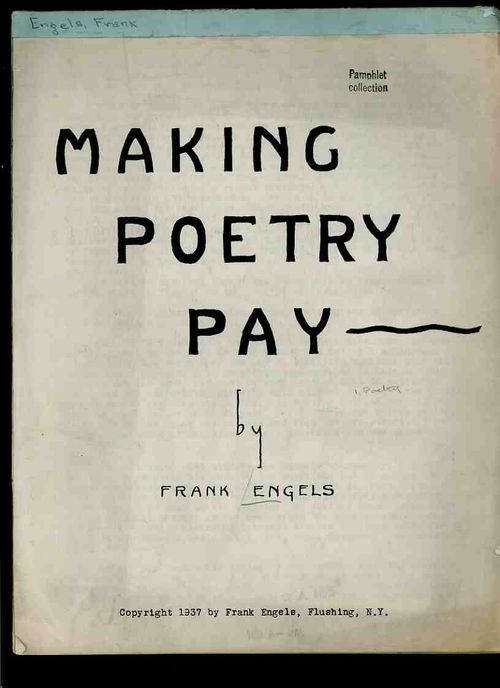JF Ptak Science Books LLC Post 389
 I wasn't sure from the cover of this exceptionally obscure work by Frank
Engels if this was
supposed to be (confused by the tone and the extended double tilde) declarative or interrogatory, or whether poetry was
supposed to generate income or if you were supposed to hurt
it/extract-exact revenge. On opening the pamphlet, which was
published by Mr. Engels in the beautifully-named but
poetically-challenged Flushing, New York (home of the World's Fair and
Archie Bunker) in 1937, we find that it does not disappoint, and assures that all of the classes of what this thing could be are accommodated.
I wasn't sure from the cover of this exceptionally obscure work by Frank
Engels if this was
supposed to be (confused by the tone and the extended double tilde) declarative or interrogatory, or whether poetry was
supposed to generate income or if you were supposed to hurt
it/extract-exact revenge. On opening the pamphlet, which was
published by Mr. Engels in the beautifully-named but
poetically-challenged Flushing, New York (home of the World's Fair and
Archie Bunker) in 1937, we find that it does not disappoint, and assures that all of the classes of what this thing could be are accommodated.
In general, though, Mr. Engels wants to let you help him make money by telling you how to make money writing poetry of all sorts and shapes, and where to sell it, and how, and by what means. Engels tells us that "there are different schools of poetry, and each contributes something to literature", and that the best poetry "makes vast appeals to the broadest interests of the reading population".Poems can be short or "book-length", and we're bolstered by the "recent poll" taken where 62,000 readers in 252 newspapers in 39 states sent in the names of their favorite poems, and the 12-line "Trees" by Joyce KIL(L)MEr was third on the list. So it "doesn't take much to be a poem liked by many", and that you "don't have to be a Longfellow" and write a book-length poem to make money in poetry.
It is best to appeal to "those fields of universal human appeal: grief, joy, hope, despair, love, simple truth, true humor", especially when trying to sell poems to magazines. "Timelessness should be considered" we are warned, and that the poem be "neat and easily read". Also, avoid selling the same poem more than once to a magazine, and "avoid this unfortunate error".
Next we are told to consider "selling by mail", selling "in pamphlet and card form". I'm not sure what that means, though the poetic reader is told that "Boyd's City Dispatch, 114 East 23rd Street, NYC, furnishes a list of 5,145 millionaires interested in art; they could , no doubt, furnish a list of wealthy poetry appreciators". Oh, dear. Mr. Engels says that "old folks" who can no longer work but whose minds and poetry are good can make money in this manner.
Next genre for poetry sales is "greeting card verse", which offers "opportunities for those who can turn out this sort of work", and that the "Greeting Card editors are the friendliest editors in the publishing field". The sales genre for "syndicating poetry", for the "prolific versifier", is just so far beyond reason, such an uninhabitable planet of possible expectations. that it is beyond comment.
Engels approaches direct selling as a possibility for the ease of being able to produce everything at home, with "Poems of varying lengths being produceable (sic) into a folder". Engels explains that one of his own "little booklets" "of 14 rhymes totalling (sic) 308 lines...cost two cents a copy to print and sells for ten cents". Also I found the following nugget: "poems about dogs artisitically (sic) lettered and framed can be sold direct or thru stores or agents for cents cents to a dollar, depending on size..."
This drags on for quite some time, even though its only three pages long. Perhaps the best of these selling scenarios, though, is the "trailer poet". "There are quite a number of trailer poets, poets who live and travel in trailers, who make their livings by selling their poems...there are upwards of 300,000 trailer travelers in America as this is being written, and the prediction of trailer manufacturers is that the number will mount to millions. Think of it,a million of more roamers whose needs, from popcorn to poems, will probably be supplied by roamers". Well. I'm not terribly sure about what "roamers" are in Engels' mind, though I've got a good idea that they're dustbowlers, trying to make their way somewhere where they were not unwelcomed. Engels reminds the reader that these people needed poetry too, and that they could be sold your poem pamphlet for 10 cents, if you had a good one to sell. If only the "trailer people" had a penny to spare...



Comments